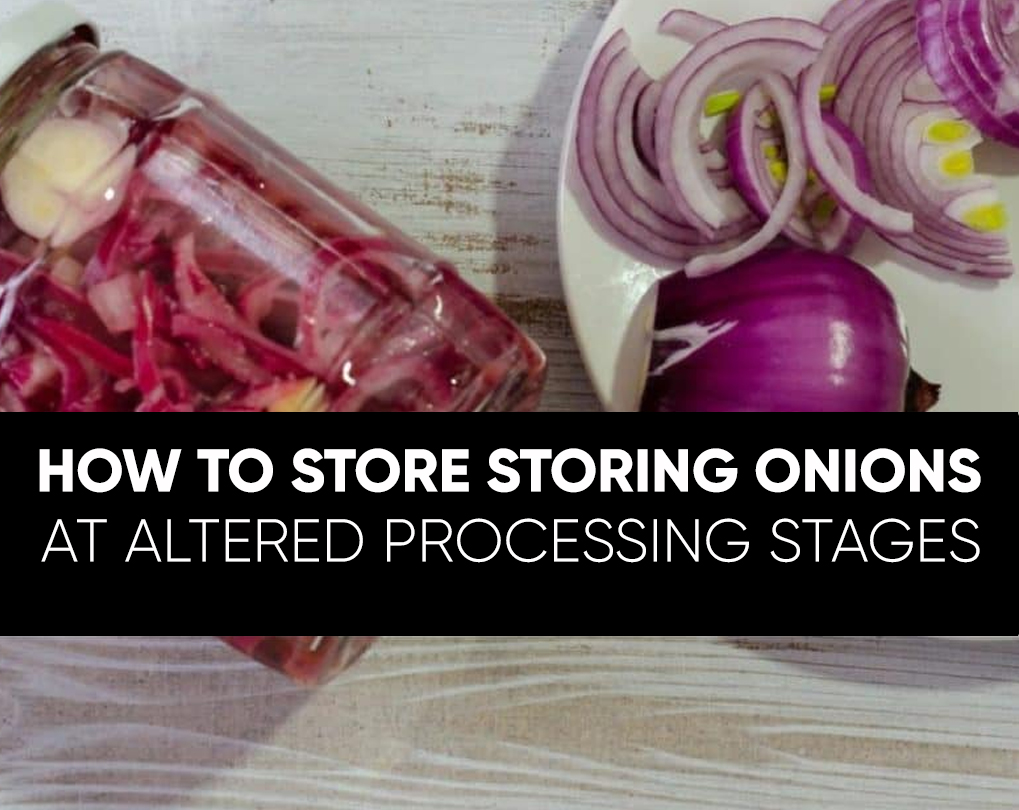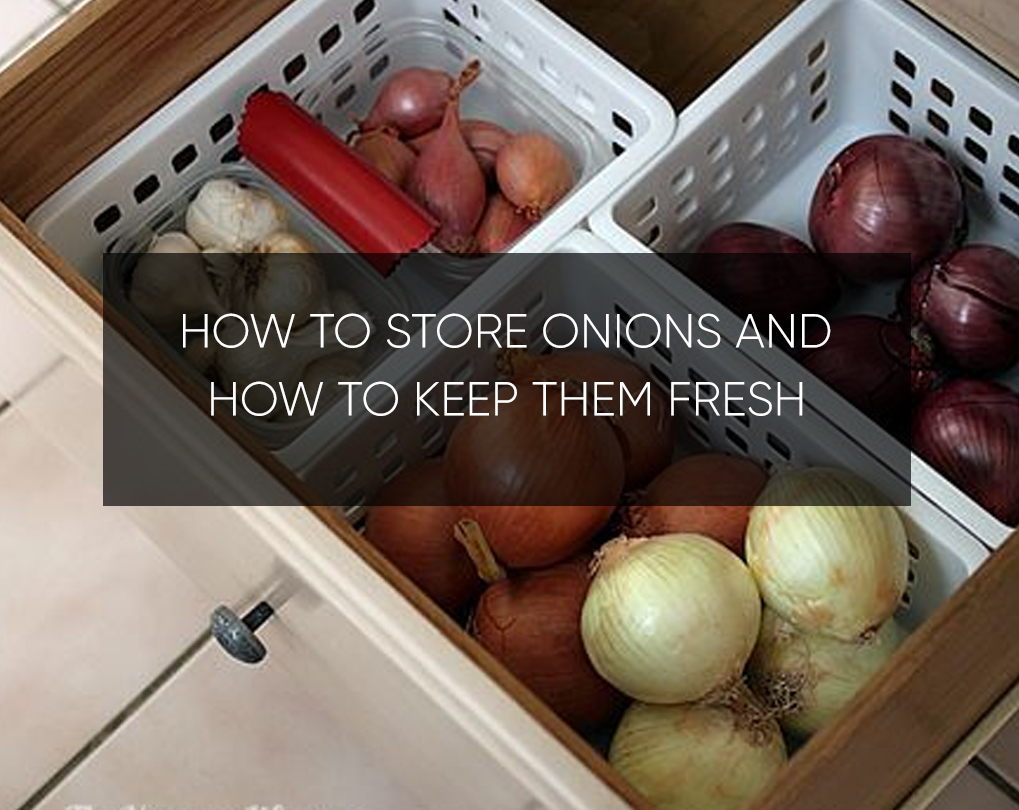Table of Contents
People often question how to Store Onions. Being a culinary staple, people mind to purchase them in bulk to avoid loss and save funds. Onions are arguably one of the common requisite elements in the kitchen. They come in various shapes, sizes, and colors, each with their individual values in cooking. Unluckily, they often go soft or start germinating before you get around to using them.
It’s truly hard to think of a life without onions. Onions are used in several recipes over the world. Originating from middle Asia, they have been identified to be used in revered by ancient Egyptians, prehistoric diets, and used as currency by Medieval Europeans.
Avoid Storing Whole Onions in the Fridge
Store purchased onions have slight skin, as they have been healed soon after accumulation. Curing treats eliminate the excess mist, letting them far distant. That’s how onions are much stored in a cool but dry, shady, and well-ventilated spot. These requirements guarantee that they don’t grasp too much moisture or sense heat or humidity.
Saving whole onions in the refrigerator flashes them to cold, humid situations. Since they consume moisture very simply, they may become muddy and decay faster. However, this does not refer to sliced, peeled, or diced onions. Uncovered onions can be saved in the freezer for up to 2 weeks, while diced or sliced onions will only last for seven to 8 days.

How to Store Storing Onions at Altered Processing Stages
To assure that your onions last as long as achievable, peculiar storage is necessary. Here are the most reliable ways to store them at various processing stages.
Peeled
Once the onion is peeled, it should be stored in the freezer to circumvent bacterial infection. Place it in a sealed container and assure your refrigerator is set to 4°C (40°F) or lower. According to the USDA, uncovered onions can be stored 10 – 14 days in the fridge.
Sliced, Cut, or Diced
Sliced onions can be put in the refrigerator for up to ten days. Just cover them tightly in a plastic coat or put them in a reseal able pouch. By the way, you can buy pre-sliced onions at several supermarkets. Make assured to put them in the freezer and use them before their termination or expiry date.
For a long time utilization, sliced, cut or diced onions can be saved in the freezer for 3 to 6 months. They are best used in cooked dishes such as soups, stews, and casseroles.
Cooked
Cooked onions can be saved in the refrigerator for 3-5 days. Just place them in a sealed container or reseal able bag within a few hours of cooking. If left outside for long periods, they may regard bacteria. Better yet, grilled onions can be stored in the refrigerator for up to 3 months.
Pickled
Pickling is a cheap-cost way of prolonging the rack life of your onions. It includes storing them in a solvent that hinders the increase of bacteria that typically destroy vegetables. Arranged this way, they may last up to 6 months.
To brine onions, put peeled onions into a ceramic jar or glass packed with vinegar and a mixture of sugar, salt, and spices that suit your flavor choices. Once opened, they are best put in the freezer, which will assist them in the last longer.
How to Store Onions in spring and Leeks in the Fridge
People usually query if there is a variation between spring onions and leeks. Spring onions, also recognized as scallions, are just young onions. They are picked before the swelling fully forms and has hollow green leaves.
Leeks are a related plant, but they do not have bulb-like spring onions. They are greater and have a crunchier surface with a softer, sweeter flavor. Since flowering onions and leeks share several similarities, they are also collected likewise.
If you intend on using your fountain onions or leeks within a day or 2, you may devise them on your counter in a jar with some water. Just make sure it’s not too warm or humid in your kitchen, or they may fade.
Nevertheless, if you expect to use them many days later, it’s best to cover them in a lightly damp paper towel and ensure the stems with a rubber band. Then put them in the abrupt drawer of your refrigerator for up to 1 and a half weeks. You can also chop and refrigerator spring onions and leeks to make them last many months. Make sure to save them in a resalable pouch or sealed container.
How to Shop for Onions
Choosing the right onions is just as valuable as storing them correctly. For routine, red onions and yellow onions, select those with dry and papery skin. Further, the exterior layer should be totally free of spotting and damp.
They should also be dense and oppressive for their size to assure that they are wet and not too ripe. Be cautious not to pick those that have begun to germinate, as they will rot speedily. You should also desist onions that have a scent to them. These may be damaged or too subtle.
For season onions, take ones with clear white, perfect bulbs, and firm stalks. Dodge those that are wilting or have a mucky layer. Search for leeks that have lots of green and white. Their stems should be firm, crisp, and clear of discoloration.
FAQs
[wps_faq style=”classic” question=”Q: How do you keep onions from rotting?”]A; The most reliable way to improve the shallow life and hold onions fresh is to save the whole. Store them in a well-aerated cool shady place: between 40-50f (4-10c). Onions will begin to germinate and rot if revealed to too much moisture and shine.[/wps_faq][wps_faq style=”classic” question=”Q: Should you refrigerate onions after cutting?”]A: Once you chopped onion, it’s important to save any leftovers in the freezer. It’s suggested to put cut onions in a sealed vessel or plastic bag while in the freezer.[/wps_faq][wps_faq style=”classic” question=”Q: Do Onions absorb bacteria in the fridge?”]A; Sliced fresh onions are an attraction for bacteria and should not be saved in the refrigerator even for short periods. The truth is that onions are not particularly prone to bacterial disease. In fact, quite the opposite. Onions feature a diversity of sulfur syntheses that have antibacterial venture.[/wps_faq]
Conclusion
It’s most suitable to store seasonal onions in a dry, cool, dark, and well-ventilated room. Areas that may give these requirements include a cellar, pantry, basement, or garage. Evade storing whole, unpeeled onions in the refrigerator, as they quickly absorb moisture. Doing so may make them become muddy and spoil faster.

